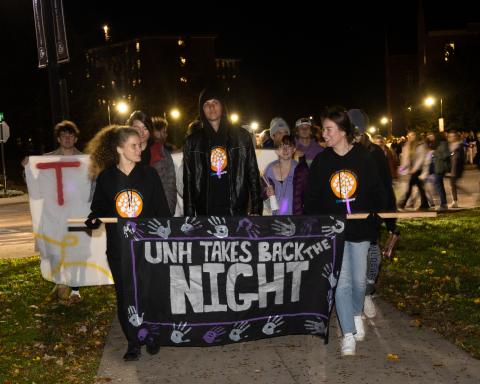Envisioning a UNH free from violence
In addition to the services The SHARPP Center provides in support of survivors, our office is committed to preventing violence before it happens.

We envision a world and campus in which resources like The SHARPP Center are not needed, because violence is not occurring in the first place. Our culture often teaches about interpersonal violence (sexual assault, stalking, harassment, relationship abuse) in a way that characterizes it as unfortunate yet inevitable, rather than as something that is wholly preventable. At The SHARPP Center, we are rooted in the knowledge that violence is preventable and everyone in our community has a role to play in working towards a UNH free from violence.
Violence prevention is an approach to eliminating interpersonal violence (IPV) that is rooted in public health and social justice. At The SHARPP Center, we also embrace a power-conscious approach[1], recognizing that IPV is perpetrated as a means to exert dominance and control, so effective prevention must reckon with and address dynamics of power. The prevalence of violence on college campuses is inextricable from systems of oppression that uphold racism, sexism, homophobia, transphobia, ableism, xenophobia, etc. Therefore, anti-violence work is and must be anti-oppression work.
We will not eliminate interpersonal violence if we only attend to individual knowledge, or only focus on institutional policies. Rather, effective anti-violence practices target individual, interpersonal, organizational, institutional, and systemic strategies for change. This is known as a social-ecological perspective. The SHARPP Center is grateful for our partners at UNH and across New Hampshire who collaborate with, champion, and support us in our work to prevent interpersonal violence.
Here are some examples of our violence prevention work:
- Educational programs focused on consent, bystander intervention, healthy relationships & relationship abuse, stalking, harassment, rape culture, and more. Request a program for your community, class, res hall/apartment, org, chapter, team, etc.!
- Events and initiatives to raise awareness about IPV/prevention
- Support of peer education and student involvement in anti-violence work through Community Educators
- Policy advocacy through the New Hampshire Coalition Against Domestic & Sexual Violence and other community partners
- Partnerships and collaboration with other departments at UNH (ex: Residential Life/Housing, Athletics, Paul College, COLA, Fraternity & Sorority Life, CONNECT, New Student Programs, The Beauregard Center, Health & Wellness, etc.)
- Representation on institutional and statewide committees and task forces
- Co-authorship of UNH's Comprehensive Prevention Plan
- Passive and interactive education through social media (@unhsharpp)
- Promotion of and partnership with UNH Health & Wellness' sexual well-being and alcohol & other drugs education/programming
[1] Linder, C. (2018). Sexual violence on campus: Power-conscious approaches to awareness, prevention, and response. Emerald Publishing Limited.